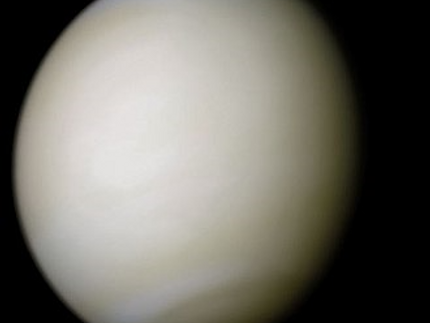The Earth seen from Apollo 17
Planet Earth has a very thin atmosphere
Planet Earth has a very thin atmosphere...
What???
Yes, that is exactly what we said. Earth's atmosphere is very thin.
But how? We are accustomed to the opposite opinion.
What it is we believe about Earth's atmosphere thickness? Does anyone think the Earth has a thick atmosphere? A very thick, maybe?
No, but we think our atmosphere is not thin. It is not very thin.
What we think about the Earth's atmosphere is that it is just all right. The Earth's atmosphere is just the way a planet's atmosphere should be.
The Earth's atmosphere pressure at the sea level is 1 bar. It consists mainly of 79% N2 and 21% O2, and water vapor 1%, and CO2 0,04% and the other trace gasses.
Let's compare Earth's atmosphere with Venus' atmosphere. Venus is almost the same size planet as Earth is. That is why Venus is called a sister planet.
The Venus' atmosphere pressure at the ground level is 92 bar. It consists mainly of 96% CO2 and 4% N2, and other trace gasses. And Venus has a runaway greenhouse effect.
For someone living on Venus the Earth's atmosphere appears to be thin. It appears to be very thin, very-very thin.
Compare the figures:
1 bar with 0,04% CO2 for Earth, and 92 bar with 96% CO2.
How much more CO2 Venus has?
Let's calculate: 92 bar * 96% / 1 bar * 0,04% =
I am taking out the calculator and we shall have
92*96*25 = 220.800 times more CO2 Venus' atmosphere has compared to Earth's.
So what we compare is 1 to 220.800 !
For someone living on the Venus the conclusion would be the planet Earth doesn't have any CO2 in its atmosphere.
Earth’s-Without-Atmosphere Surface Mean Temperature Equation Tmean.earth gives us:
Tmean.earth = [ Φ (1-a) So (β*N*cp)¹ ∕ ⁴ /4σ ]¹∕ ⁴
Τmean.earth = [ 0,47(1-0,30)1.362 W/m²(150 days*gr*oC/rotation*cal *1rotations/day*1 cal/gr*oC)¹ ∕ ⁴ /4*5,67*10⁻⁸ W/m²K⁴ ]¹∕ ⁴ =
Τmean.earth = [0,47(1-0,30)1.362 W/m²(150*1*1)¹∕ ⁴ /4*5,67*10⁻⁸ W/m²K⁴]¹∕ ⁴ =
Tmean.earth = 288,36 Κ
And we compare it with the
Tsat.mean.earth = 288 K, measured by satellites.
These two temperatures for Earth, the calculated one, and the measured by satellites are almost identical.
But when we calculate Venus'-Without-Atmosphere Surface Mean Temperature by the same Equation, using planet Venus' data we are getting:
Tmean.venus = 259,7 K
And we compare it with the
Tsat.mean.venus = 737 K, measured by satellites.
Those two temperatures for Venus, the calculated one, and the measured by satellites are completely different !
That is why we confirm here that yes, Venus has a runaway greenhouse effect because of its very thick atmosphere, Venus has a very strong greenhouse effect.
The Earth, on the other hand, doesn't have any measurable greenhouse effect. Earth has only some traces of greenhouse gasses.
Earth has only some tiny traces of greenhouse effect, if to speak scientifically, in full accordance with the physics.
We cannot completely deny Earth having greenhouse effect, how could we... we only compare it being
1 to 220.800 !
Venus: A real-colour image taken by Mariner 10
.
https://www.cristos-vournas.com
The faster a planet rotates (n2>n1) the higher is the planet’s average (mean) temperature T↑mean:
Tmin↑→ T↑mean ← T↓max
.

